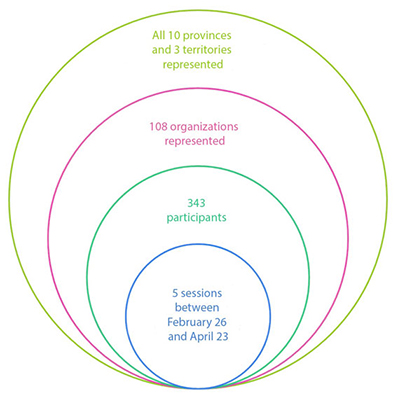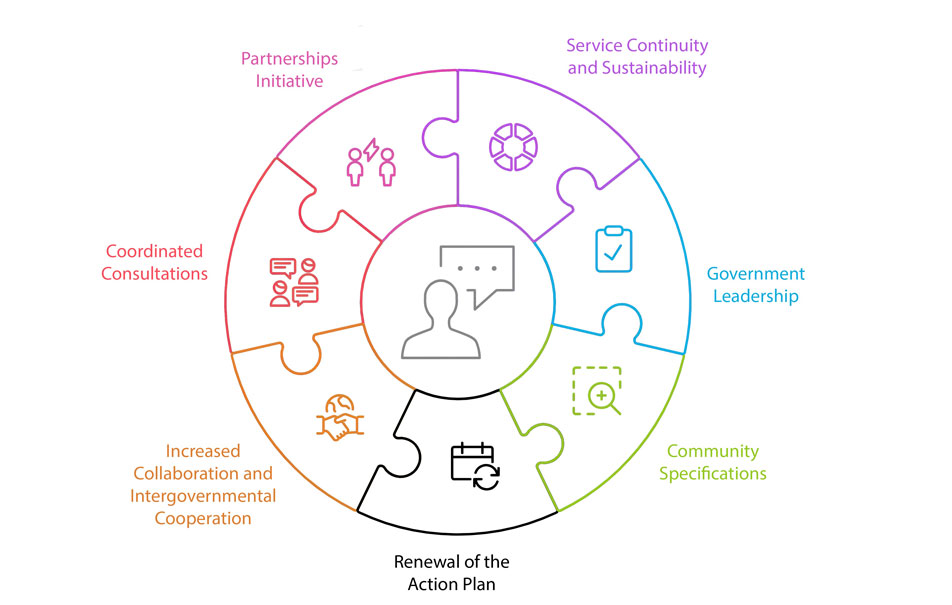Summary of consultations on the implementation of the Partnerships to Strengthen Part VII of the Official Languages Act initiative
On this page
Alternate format

Summary of consultations on the implementation of the Partnerships to Strengthen Part VII of the Official Languages Act initiative [PDF version - 1.00 MB]
Background
The Action Plan for Official Languages 2023–2028: Protection–Promotion–Collaboration (the Action Plan) features 82 initiatives in support of official languages totalling $4.1 billion over 5 years.
In April 2023, the Action Plan announced $20.1 million over 5 years for the Partnerships to Strengthen Part VII of the Official Languages Act initiative, originally announced as the Centre for Strengthening Part VII of the Official Languages Act at the federal level. This initiative seeks to advance the substantive equality of English and French in Canadian society. It is a shared responsibility of Canadian Heritage and the Treasury Board Secretariat.
Functions of Canadian Heritage
- Develop, coordinate and implement federal official languages strategies (Action Plan for Official Languages 2023–2028).
- Ensure regional coordination and ongoing collaboration with stakeholders outside the Government of Canada by promoting a "by and for" approach.
Functions of the Treasury Board Secretariat
- Develop and implement regulations under Part VII of the Official Languages Act, and develop related guidance tools in support of the application and interpretation of that Part of the Act.
- Provide governance and leadership for, and promote, official languages and Part VII of the Act within the federal administration.
Canadian Heritage has adopted a strategic, targeted horizontal approach to its interventions in order to make a meaningful impact on official language minority communities. In 2024–2025, the Department’s interdepartmental efforts have focused on the following objectives in support of the implementation of the Action Plan and the new requirements under the modernized Official Languages Act (Act):
Increased official languages funding for non-governmental organizations
- A number of Action Plan initiatives will provide the necessary funds for direct increases to non-governmental organizations.
- These increases total more than $300 million over 5 years in key sectors, such as health, justice, employment, economic development, support for key institutions, and arts and culture.
- Some 310 Canadian Heritage portfolio organizations will see a 12.5% increase in their annual funding from 2023 to 2028. Organizations whose mandates are aligned with government priorities could see additional increases of up to 25%.
Strengthened accountability
- The Action Plan provides for improved annual reporting to better track its disbursements and the achievement of its overarching societal outcomes.
- An Accountability Framework for the Action Plan will be publicly released on Canada.ca in 2024–2025, and there will be comprehensive reporting on Action Plan initiatives on an annual basis.
Strengthening Part VII of the Official Languages Act
- Canadian Heritage and the Treasury Board Secretariat are implementing this horizontal initiative to strengthen the taking of positive measures by federal institutions in support of the new requirements under the modernized Official Languages Act.
- In 2024–2025, thematic dialogues aimed at cross-stakeholder collaboration informed by the “by and for” approach will be organized around the following priorities: (i) restoring the demographic weight of Francophones; (ii) employment and economic development in minority settings; and (iii) protecting and promoting French, including in Quebec.
The Consultations
Early in 2024, after obtaining the necessary budgetary authorities, Canadian Heritage invited the key stakeholders to a series of consultations. The aim was to establish the priorities for the launch of this initiative before the end of first year of the Action Plan.
This series of consultations focused on the functions of Canadian Heritage as part of this initiative. The sessions were an opportunity to: present the various responsibilities under this initiative and the new commitments in the modernized Act; explore the new departmental responsibilities with respect to advancing the equality of status and use of English and French (Part VII of the Act); provide an update on the implementation of the Action Plan; and review next steps.
Canadian Heritage values dialogue, and the consultations were an opportunity to think through this horizontal initiative for strengthening Part VII of the Official Languages Act with key stakeholders.
This was an opportunity for Canadian Heritage to discuss the future of this Action Plan initiative with key stakeholders.
Under the Act, Canadian Heritage is responsible for ongoing collaboration with stakeholders outside the Government of Canada. These sessions served to enhance and renew the ongoing dialogue between key official languages stakeholders and the Government of Canada and were an opportunity to reflect together on how best to orchestrate that collaboration between federal institutions and external stakeholders in the context of this initiative.
Five sessions were organized with:
- groups representing the interests of Francophone minority communities;
- groups representing the interests of Quebec’s English-speaking communities;
- groups working to advance the learning and appreciation of English or French as a second language and bilingualism;
- groups working to protect French in Canada, including in Quebec; and
- representatives of the provincial and territorial governments, specifically those responsible for Francophone affairs.
What we asked

During these sessions, Canadian Heritage challenged participants to identify potential priorities for this initiative over the next five years. Together, they also sought to identify areas complementary to those mentioned in the Action Plan that could guide federal efforts on official languages.
Participants discussed opportunities through which this initiative could advance the equality of status and use of the official languages. They also looked at ways of strengthening engagement and collaboration among the initiative’s partners and all those involved in protecting and promoting the official languages. Lastly, these consultation sessions explored how the Partnerships could facilitate exchanges with federal institutions and highlighted examples of effective collaborative practices that are meeting the needs of official language communities.
What we heard
Over the course of the five sessions, stakeholders raised several points. These points can be grouped into nine themes:

Puzzle – text version
Seven puzzles pieces form a circle, each piece represent a major topic heard throughout the sessions. The topics listed clockwise in the puzzle pieces are: Partnership initiative, Service continuity and sustainability, Government Leadership, Community specifications, Renewal of the Action Plan, Increased Collaboration and intergovernmental cooperation, coordinated consultations.
Service continuity and sustainability
- Take steps and make the necessary efforts to avoid placing official language minority communities in a situation where they have difficulty accessing services or face service interruptions.
- Provide better direction, accurate information and clear instructions to guide organizations through the funding process, maximizing the impact and continuity of their initiatives.
Stronger leadership on the part of the government and its institutions, clear responsibilities and departmental accountability
- Play a leadership role to discourage federal institutions from shirking their responsibilities under Part VII of the Act. All institutions must be engaged, and leadership strengthened, in order to clearly communicate the priorities and actions expected of federal institutions in support of community vitality and the substantive equality of the two official languages.
- Clarify, detail and communicate the roles and responsibilities of Canadian Heritage and the Treasury Board Secretariat in the context of these Partnerships.
Specific characteristics of communities and evidence
- Give greater consideration to the specific realities and challenges of official language minority communities in the interest of more effective implementation of government programs, stressing the importance of basing decisions on evidence and research (e.g. labour shortages, geographic realities, elements of diversity within communities, economic disparities and youth aspirations).
- Prioritize the following sectors or themes, which are of particular concern to Quebec’s English-speaking communities: identity, heritage, sense of belonging, community leadership, employment, education, collaboration and citizen participation within the broader linguistic environment.
- Promote access to and sharing of research data on Francophone communities by prioritizing Francophone knowledge and research in the development of public policy.
Renewal of the Action Plan
- Consider new federal institutions and any emerging sectors or priorities in planning and implementing the next Action Plan.
- Document which societal groups are receiving Action Plan funding, and which are not; this would support improvements in strategic areas related to community vitality.
Increased collaboration and intergovernmental cooperation
- Foster more and better collaboration among federal institutions; between federal institutions and external stakeholders; between the various levels of government; and even between the Canadian Francophonie and the international Francophonie.
- Rethink intergovernmental cooperation and relations between levels of government and external stakeholders, as some want to see the communities more involved in implementing government priorities (according to a “by and for” approach), while others want departmental responsibilities and the constitutional obligations of the provincial and territorial governments to be respected.
Coordinated consultations
- Better coordinate, plan and create synergies to encourage effective, supported participation on the part of all players whenever federal institutions are consulting stakeholders. A certain amount of “consultation fatigue” was reported in relation to consultations that overlap or are not coordinated in a concerted fashion at the federal level.
- Create a public portal that would report on all official languages consultations at the federal level.
- Encourage separate consultations for English-speaking and French-speaking minority communities to allow each community to express its own distinct needs.
The Partnerships initiative, a key tool for strengthening Part VII
- Use this initiative to support the following concepts, realities and visions, which are central to the reform of Canada’s language regime:
- the substantive equality of Canada’s official languages;
- the necessity of protecting and promoting the French language throughout Canada, including Quebec;
- evidence-based decision-making (with such evidence to include an expanded volume of scientific publication in French);
- the potential that young people represent; and
- the development of synergies between federal partners and official language minority communities.
Conclusions
The Partnerships to Strengthen Part VII of the Official Languages Act initiative will play a key role in how the government implements the commitments in the Act.
This first series of consultations marks the start of an ongoing dialogue on the implementation of the Action Plan and future areas for action under this initiative. Between now and 2028, partners and stakeholders will be regularly informed of upcoming developments, commitments and deliverables. They are also encouraged to stay involved in the process and continue to share their ideas and recommendations.
The Partnerships embody an enterprising vision of collaboration, engagement and ongoing dialogue with official language minority communities, the provinces and territories, and our federal partners in the context of advancing the substantive equality of English and French in Canadian society. It is by thinking things through together and coordinating and pooling our efforts that we will bring about real change in furtherance of our shared mission.